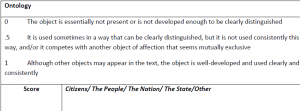Stephen Cranney and Dr. Kirk Hawkins, Department Political Science
The project Dr. Hawkins, Mayavel Amado, and I completed with the assistance of the ORCA funds provided was an extension of a previous project that we presented at the American Political Science Association’s annual meeting in 2010. Specifically, that paper presented theoretical possibilities for expanding the study of rhetorical categorizations beyond populism—-the only field in which there had been previous research. Specifically, this project was an attempt to empirically verify what we argued in that paper. We used the same methodology he used earlier (Hawkins 2009) to classify and delineate populism as a political discourse and applied it to other forms of political discourse, namely, benign nationalism, militant patriotism, and pragmatism.
Political worldviews and their accompanying discourses is a subject often discussed, implied, or utilized in other forms of political research, as well as informal dialogue. However, for the centrality of the role of political worldview in virtually all comparative political or international studies, there had been no empirical work done to precisely define and categorize the concepts contained within political discourse.
As previously noted, Dr. Hawkins, Mayavel Amado (a graduate student who is not an ORCA co-investigator, but who will be working on this project), and I used the same methodology Dr. Hawkins used for his similar study done on populism (2009). Specifically, we used our extensive collective knowledge to construct rubrics (see Appendix I for an abbreviated version without the descriptions) against which political speeches will be compared in order to categorize them within typologies. Validity was established by trained student readers who measured the level to which each category applied to the speech in question. We then generated a rho statistic in order to establish inter-rater reliability. We believe that our rubrics will be able to detect and taxonomize naturally occurring groupings within various political discourses, which we will then use to formally map out political worldviews. Generally, operationalizations of ideological concepts are difficult and rarely attempted. However, the validity of this technique, pioneered by my mentor, has been recognized in the peer-reviewed literature.
However, we did not obtain the results we thought we would have liked. Specifically, our Rho-statistics did not meet the standard acceptable level of statistical significance in the social sciences (p=.05) in quite a few cases. In other words, our graders did not have a sufficient level of accordance for us to argue that they were able to consistently detect some of these themes. We were able to find some rhetorical patterns under the “cosmology” categories. However, these had already been established in Dr. Hawkins’ previous work, and we were not able to find any for the “ontologies” (i.e. what the central object of affection is within the speech), which is really what we were looking for. Here, there was wide variation.
Consequentially, Dr. Hawkins and Ms. Amado will be going back to the drawing board and re-constructing the rubrics. However, I will be starting my PhD program at the University of Pennsylvania this fall, and will be unable to continue with the project.

References
- Hawkins, Kirk A. 2009. “Is Chávez populist? Measuring populist discourse in comparative perspective.” Comparative Political Studies. 42 (8): 1040-67.
- Hawkins, Kirk A. Mayavel Amado, and Stephen Cranney. 2010 “Beyond Populism: A Typology of Elite Political Discourse with Some Examples.” Paper presented at the Annual Meeting of the American Political Science Association, Washington D.C. September 1-5.


